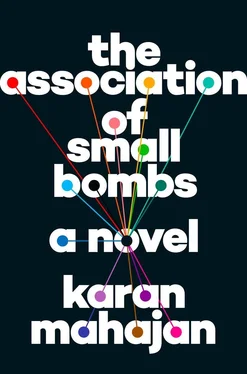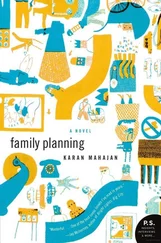________
Mansoor prayed that nothing had happened, that Ayub had not been caught, that all of this fell behind them.
Then, the unraveling began — but in the strangest way.
For years, the Delhi police, as well as Khurana and Gill — first individually, then collaboratively — had been tracking Shockie. Three years after the 1996 blast, Malik had actually broken down and fingered Shockie, though he had returned quickly to a contrite silence.
Ever since then there had been a bounty on Shockie’s head and a great deal of intelligence expended in failing to capture him. So it was a surprise when, a few days after the Sarojini Nagar blast, he was arrested.
It was a triumphant moment for everyone. A flighty, bald, wet-eyed man was produced in the lockup. He looked like an electrician — like someone you might hire for handiwork at Lajpat Nagar. There was nothing terroristic about him. Gill and the Khuranas watched with delight from behind a glass window as he was interrogated and beaten.
After three days of torture, he angrily confessed. “The real mastermind is Ayub Azmi. He’s done the last ten blasts. I’ve been his servant.”
“Who’s that?”
“A young man,” Shockie said. “An activist from Azamgarh. That’s why he was never detected. He was injured in the Sarojini Nagar blast.” Shockie secretly blamed Ayub for his arrest. Actually, he had become quite attached to Ayub, the way he had been attached to Malik, and had stayed on in Delhi hoping Ayub would reappear at the park. But it was Shockie’s constant presence in the park that had attracted the attention of a paranoid man who lived on the periphery. Soon after this man had contacted the police and a policeman had matched Shockie to his photo.
________
After escaping from Delhi, Ayub went to the base near Hubli. But when he got there, exhausted — his exhaustion only fully expressing itself now, as it does at the tail end of journeys that have been soaked and powered by adrenaline — Tauqeer, looking gaunt and ill only wanted to know where Shockie was.
“I thought he had come back.”
“Obviously he didn’t.”
“I assumed he had.” Ayub unconsciously covered his gashed left eye; it was lacking a patch now. No one in the group appeared to notice or care.
Soon after, the group learned Shockie had been arrested, and in a panic — but a smooth one; the group was made for panicky situations, even looked forward to them — split up into cells and went in different directions. Shafi and Rafiq went north, to Kathmandu. Waris and Karim headed to Gujarat. Ayub and Tauqeer hurtled overland, in the back of a truck, to a secluded beach in Kerala. Once there, Tauqeer and he settled into a hut on the beach.
The first two days were almost pleasant. Ayub liked Tauqeer now and they talked about Palestine and Carlos the Jackal. Then one evening, after going out for a walk, Tauqeer vanished.
The problem with this was that Tauqeer locked the door whenever he left; Ayub couldn’t get out of the hut. For a few hours he sat cross-legged in the sand.
He could hear the ocean susurrating beyond and after a while, he pounded the door and threw his bulk against it but the force was useless; the door was metal, clasped with a chitkani outside.
He sat back down in the sand and told himself not to worry. Tauqeer would come back for him.
Night came — no Tauqeer. He drowsed and drooled, hungry. He hadn’t eaten in a day. He was thirsty too; to get to the water under the sand, he began to dig.
He passed out. When he woke the next day, he was in another hut, on an operating table of some sort. “I’m glad you found me,” he said with a smile, still surprisingly weak. “Is there a drip here? Some glucose?”
He had a vague memory of waking and trying to open the door of the hut and then passing out again.
The doctor, who was wearing a face mask, said to another man in the dark corner, “Our friend is awake.” He had kind eyes that closed into slits.
“Tauqeer bhai?” Ayub asked. “Are you there? Was the key to the hut lost or what?”
The man in the shadows did not answer.
Ayub became aware that he was undressed to his waist. More to the point: there was a strange square scar on his chest, where a scalpel had been recently applied. The skin was reddish, welted, peeling.
“Did I need to have surgery? Was I very sick?”
“You are the bomb,” the doctor said.
Ayub moaned and tried to turn over.
The doctor tapped his chest with a blunt cold metal instrument. “We’ve put a bomb in you. It’s a new kind of bomb, since you’re curious. It isn’t timed. It goes off when you move your body in a particular way.”
Ayub’s broad shoulders shook and compressed. His leg muscles tensed. “What did I do?”
“We know who you’re working for,” the man in the corner said. It was Tauqeer after all.
The doctor helped Ayub off the table. “It’s OK,” he said. “You can walk. Here,” he said. “Put this shirt on.” Ayub complied, hunching himself to accept the shirt. He was very weak.
He must have been walked some distance in this drowsy state, because when he came to, he was on a deserted beach.
Tauqeer and the doctor were gone. The hut was gone. The birds struggled in the wind like flies in honey. The sounds were enormous, the ocean regally hushing the beach. It was beautiful. He tried not to move — to avoid the secret configuration that might set off the bomb. With one hand he picked at the sand, kneaded it. What a waste of a life, of talent. Did he believe he would explode? Of course. Stranger things have happened. He had never experienced such a fear of the body before, not even with his back pain, or the bomb he’d planted in Delhi. The body itself was abhorrent. It could be made subservient to anything. It could work for despots, tyrants, fascists, terrorists — it could work for machines. He realized the pointlessness, at a time like this, of having a mind. He kept imagining the form the explosion would take, how it might gush out of him like a white star, pelting the ocean with soft embers and pieces of his skin. What was a bomb, really? A means of separation, of opening. A factory of undoing. It took the violent forces of civilization and applied them to the very opposite aims with a childlike glee. A bomb was a child. A tantrum directed at all things. A wail of a being that hadn’t got its own way. The choice of suicide over defeat. Ayub, in his reading of Marxist history and leftist theory, had always been interested in the role of bombs; now he too was a weapon, part of a long evolution of revolution. In that instant, he was connected to the bomb throwers of the past and the bomb men of the future. Entire cities of exploding people might exist someday. He saw a hut in the distance. Casting aside fear for an instant, he got up and ran.
He punched out holes in the sand with his feet, breathing, hyperventilating. His pellucid, cellophane-like toenails, advancing feelers of dead skin, were small helmets of death on the living crab of the foot. The metal object implanted in his chest rattled. His body, for all its glaring tension, was free of pain. Arriving at the hut, he panted and waited, hoping someone would show up. But it was a bombed-out husk. No one was there. He saw an entire village of husks leading up a hill.
He wondered if this was a place that had gone extinct in an experiment of the sort that was being carried out on him. Tired and hungry, his eyes fastened on a glistening mound of coconuts — green balls with flattened heads and straws sticking out of them. The hunger was so bad, it overrode his fear of dying. On his knees he got before the mound of coconuts and sucked the tart juice from the used husks. It came out one drop at a time. It was pink overhead, the sky. He knew he had to go to the police.
Читать дальше












